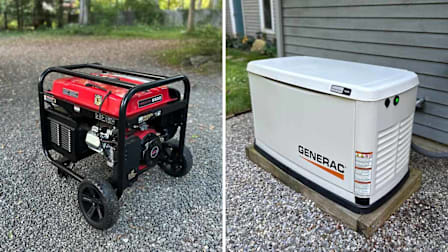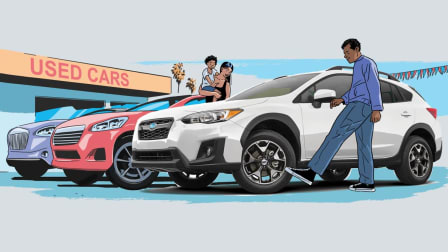Should You Switch to Electric Lawn Equipment?
Electric outdoor tools—which typically use lithium-ion batteries—have some advantages and disadvantages compared with gas-powered models

Across the U.S., the roar of gasoline-powered lawn mowers, leaf blowers, string trimmers, and other outdoor power tools is being replaced by the less punishing whir of their electric counterparts.
“Moving away from gas-powered lawn equipment is about not just environmental protection but also your own personal health,” says Shanika Whitehurst, associate director of product sustainability, research, and testing at Consumer Reports.
Emissions from gas-powered outdoor tools have been linked to lymphoma, leukemia, and other cancers. And without proper ear protection, people handling those cacophonous machines for long spells can eventually suffer irreversible hearing loss.
Electric outdoor tools offer other benefits, too. They don’t produce smelly fumes. Larger electrics don’t require the messy maintenance—oil and spark plug changes, and winterizing—that gas models do. You don’t have to run to the gas station or a home improvement store to get fuel. And the power source—typically, lithium-ion batteries—can often be shared among outdoor tools of the same brand.
Does Electric Lawn Equipment Work as Well as Gas?
We analyzed performance data from our tests of walk-behind lawn mowers, leaf blowers, and string trimmers to see whether gas models are better than electrics. Here’s what we found:
- Lawn mowers: On average, gas walk-behind mowers slightly outmatch electric lawn mowers purely on cutting performance. But for noise, maneuverability, and ease of maintenance, electric mowers have the advantage.
- Leaf blowers: Electric leaf blowers are the clear winners. The only situation in which a gas leaf blower truly makes sense is if you’re not ready to go electric and you have a big yard filled with leafy trees that shed seasonally.
- String trimmers: Electric and gas string trimmers perform equally as well in our tests.
Is Electric or Gas Lawn Equipment More Reliable?
For top-tier reliability, you have far more choices among battery and corded electric leaf blowers and string trimmer brands. Our survey-based reliability ratings of walk-behind lawn mower brands show that gas-powered brands may receive higher reliability scores, but that there are more electric-powered brands to choose from, and their reliability scores are respectable, too.
- Walk-behind lawn mowers: While only three gas-powered push mower brands earned the highest possible reliability score, six electric-powered (battery) push mower brands performed better than average. One gas-powered self-propelled mower brand earned very good (or great) reliability ratings, while two battery self-propelled mower brands did the same.
- Leaf blowers: Not a single gas handheld leaf blower brand we tested earned above a middling reliability rating. In contrast, 15 corded electric and battery handheld leaf blowers brands that we tested earned good-to-great reliability ratings.
- String trimmers: While both electric and gas string trimmer brands have models that perform reliably, five electric string trimmer brands earned our highest reliability rating, and nine electric trimmers performed near the top. (On the other hand, none of the gas trimmer brands we tested received our highest rating, though four gas string trimmer brands are near the top of our reliability ratings.)
Is Electric Lawn Equipment a Good Investment?
When we analyzed the costs of choosing an electric push- or self-propelled mower over a gas one, we found that in general, you’d save money with an electric mower within a five-year ownership period, if not earlier. “The initial investment can be higher for an electric mower,” says Misha Kollontai, the engineer who led outdoor power equipment testing for years at Consumer Reports. “But after that point, a gas mower costs significantly more to maintain and run.”
That might not be the case, though, if you buy a very pricey electric push mower instead of an inexpensive gas model.
CR's Guide to Sustainable Living
Find eco-friendly products and smart strategies for a green home.
One factor we didn’t include in our analysis was the cost of buying a replacement battery. You’ll eventually need to buy a new one, something you won’t need to do with gas outdoor tools. A typical battery can cost $100 to $300, with some running above $400.
One way to deal with that concern is to choose a higher-rated product with a longer battery warranty; most last three years and a few go as long as four. But it can be hard to predict when you’ll need a new battery, Kollontai says: “Following manufacturer recommendations on the use, charging, and off-season storage of your battery will help maximize its life.”
That said, if you’ve decided to commit to electric outdoor tools and are in the market now, don’t wait. “If you’re ahead of the game and buy now, or in early September when the sales usually take place, it might benefit you in the long run” even though prices have started to level off since the pandemic, says Courtney Pennicooke, the Consumer Reports market analyst who covers these products.
Should You Wait for the Batteries to Improve?
To be sure, newer lithium-ion batteries are developing rapidly, lasting far longer between charges. The amount of energy they put out relative to their volume—their “energy density”—has improved by a striking 9 percent annually between 2015 and 2023, says Simon Mui, an expert in battery technology who works for the Natural Resources Defense Council based in New York City.
But battery makers aren’t going to just leave consumers in a lurch, Kollontai says. Manufacturers have already gone through a few iterations of their batteries and they’re all still doing so, he says. “More likely than not, any battery you buy today will continue to be supported for years to come,” Kollontai says. “If a new technology emerges, it will likely be phased in slowly, and not replace an existing battery design overnight.”
Toro, an outdoor power equipment maker, is in the process of designing its lawn mowers, chainsaws, leaf blowers, string trimmers, and other electric tools to house more powerful batteries that are the same dimensions as current batteries, or to house more than one size of battery. “We always wanted customers who bought into the platform to stay in the platform,” says Adam Russell, marketing manager for Toro’s residential landscape contracting division.
And because consumer-level battery technology isn’t very complex, an increasing number of third-party manufacturers will sell lower-cost generic batteries to fit a variety of housings, Mui says.




